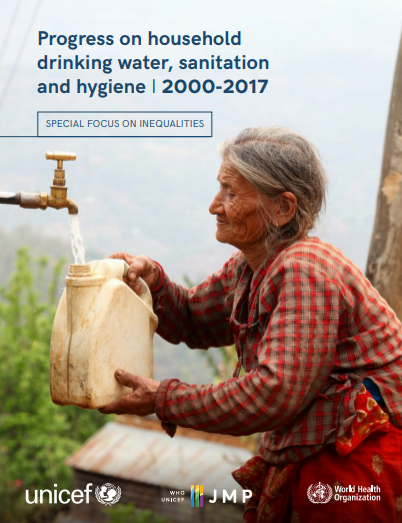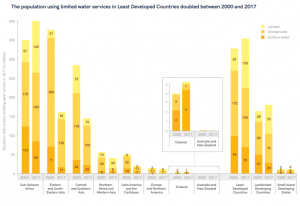UN warns universal access to basic water, sanitation and hygiene services will not be reached by 2030
- June 19, 2019
- Posted by: Elaine Coles
- Category: Europe

New data from the UN Children’s Fund (UNICEF) and the UN World Health Organisation (WHO) suggests that universal access to even basic water, sanitation and hygiene services will not be achieved by 2030 at current rates of progress.
Over 2 billion people still do not have access to even basic sanitation according to new data released yesterday from the WHO and UNICEF’s Joint Monitoring Programme for Water Supply, Sanitation and Hygiene (JMP). This is equivalent to 26% of the world’s population or one in four people.
Despite progress – 2.1 billion people gained access to a decent toilet between 2000 and 2017 – the statistics highlight how vast in scale the water, sanitation and hygiene (WASH) crisis still is.
With just over a decade to meet Sustainable Development Goal (SDG) 6 and bring clean water and good sanitation to everyone, the rate of progress is still far too slow. The target level of provision set by SDG6 is of “safely managed sanitation” – so providing everyone with a toilet that is linked to a system of safe waste disposal. Without a dramatic progress shift, universal access will not be achieved for decades and will undermine the progress of virtually every other SDG.
785 million people still lack access to even basic water service
The global figures on access to water are better but still worrying, with 785 million people (10%) still lacking access to even a basic water service. This is an improvement on the 844 million people who lacked access in 2015, the last time this data was collected.
However, basic access falls below the ambition of SDG6 of everyone having access to a safely managed water supply which demands that everyone has a household service that is reliable and tested to be safe. Over a quarter of people (29%) do not have access to a safely managed supply, putting them at risk of water-borne diseases such as diarrhoea and cholera. Rates of progress are currently too slow to reach even basic access and we are even further away from meeting the SDG6 ambition.
The data also points to the huge inequalities that exist within countries, with the starkest differences seen with access to sanitation services. In Namibia, just 4% of the poorest people had basic access to toilets, compared to 87% of the richest people. Angola had the biggest gap between rich (94%) and poor (17%) basic access to water.
A statement released by UNICEF and WHO said:
“The poorest and most marginalised people are still being left behind and denied these basic human rights. Until we can close these vast gaps in access, achieving SDG6 is impossible.”
For the first time, global estimates on hygiene were included. Around the world, 3 billion people (40%) lacked basic handwashing facilities that have soap and water. The greatest hygiene inequality exists in Pakistan with a gap of 77% between the richest and poorest people’s access to handwashing facilities with soap and water.
Top three countries with the least access to water, sanitation and hygiene are in Africa
The top three countries with the least access to water, sanitation and hygiene were African nations. Chad had the highest proportion of people without access to at least a basic water service (61%) and Ethiopia had the highest proportion without basic sanitation (93%). Nearly all (99%) people in Liberia do not have access to basic hygiene facilities. Worryingly, the sanitation situation in Chad and other countries including Gambia and the Democratic Republic of the Congo has declined since 2015.
Lack of financing and capacity continues to be a major blockage to improvements that could drastically change the lives of millions of people in these and many other countries.
The data, which was collected in 2017, also found that:
- Eight out of ten people who lacked even a basic water services lived in rural areas.
- Only one in three countries with less than 99% access to a basic water service were on track to achieve ‘nearly universal’ coverage by 2030.
- Between 2000 and 2017 the population practising open defecation halved from 1.3 billion to 673 million. The greatest decrease was seen in Central and Southern Asia.
- One in four countries with less than 99% access to basic sanitation services were on track to achieve ‘nearly universal’ coverage by 2030.
WaterAid calls for step change in approach to universal access
Tim Wainwright, Chief Executive of WaterAid UK commented:
“Too many people are still denied access to the basic human rights that so many of us around the world take for granted. The gains are encouraging, but they fall dramatically below what we need if we are to achieve SDG6 and bring clean water, decent toilets and good hygiene to everyone, everywhere by 2030.
“We must turn our attention to closing the huge gaps that exist between the experiences of the poorest and richest people within countries. It is the poorest and most marginalised people who have the most to gain from accessing good water, sanitation and hygiene services and breaking free of poverty.
“We need an urgent step change in how we all work towards the goal of universal access. Clean water, decent sanitation and good hygiene together is the foundation that underpins almost all of the SDGs, from health to education, to nutrition and the environment. There can be no end to poverty without universal access, but we are still failing to make this a reality. If all of us across governments, civil society and the private sector work to galvanise the revolution in approach this crisis needs, this is a problem we can – and will – solve.”
